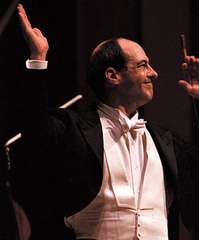|
Back
Paean For a Politically Tone-Deaf World New York
Isaac Stern Auditorium, Carnegie Hall
04/30/2014 -
Benjamin Britten: War Requiem, opus 66
Evelina Dobracheva (Soprano), Thomas Cooley (Tenor), Stephen Powell (Baritone)
Atlanta Symphony Orchestra Chorus, Norman Mackenzie (Director), Brooklyn Youth Chorus, Dianne Berkun-Menaker (Artistic Director), Atlanta Symphony Orchestra, Robert Spano (Music Director and Conductor)

R. Spano (© Andrew Eccles)
Whenever Robert Spano breaks loose from Atlanta’s plantations and hominy grits for New York, we are meant for bitter disappointments and elevated surprises. The disappointment is that Maestro Spano isn’t taking refuge in Manhattan (or in Brooklyn, where he had led the Brooklyn Philharmonic). The surprise is that he is always surprising us.
Mr. Spano never shrinks from traveling to the outer regions of the musical universe. Whether it be the mammoth mass of Golijov (or the equally gargantuan Berlioz Requiem), or the premiere of an Esa-Pekka Salonen work, or music by Messiaen, he has become an iconic figure of grand works, grandly done.
Continuing the tradition last night in Carnegie Hall, his Atlanta Symphony Orchestra and Chorus, with the immaculate music-making of the Brooklyn Youth Chorus, performed Benjamin Britten’s most sheerly emotional work, the War Requiem, which of course is a peace requiem.
Britten, a pacifist throughout his life, an eloquent internationalist, wrote his War Requiem with the words of Britain’s most illustrious “war poet’, Wilfred Owens, as well as the words of the Catholic Mass. It was slated to be performed in a cathedral, and hopefully for soloists who spanned many countries. (Actually, his choice of a Russian soprano for the opening was opposed by the Soviet Union, whose government wouldn’t allow his soprano to go abroad.) But whatever its venue, whoever the soloists and ensembles are, when conducted with all due reverence, it makes an awesome effect.
Several years ago, the Carnegie Hall Requiem was once performed with the boys’ choir up in the second balcony, hoping to replicate a churchly resonance. Mr. Spano resisted this. The young Brooklyn Youth Choir, trained by Dianne Merkun-Benaker, had more young women than boys, but this hardly detracted from the finesse, confidence and clarity of the ensemble.
So while these forces never quite achieved the spatial dimensions needed by the composer, Mr. Spano gave an offering which was properly reverent, dynamically exciting and, at the end, with one of the most beautiful farewells in ecclesiastical literature.
The excitement was provided by the Atlanta Symphony Orchestra, whose shimmering brass in the Dies Irae almost shattered the auditorium. The percussion consort, gathered at the side of the stage, played those opening and closing bells, and gave impact to the more dynamic sections of the work. Mr. Spano brought up the sound-waves of the Sanctus and gave a pretty intense Libera Me, from both chorus and orchestra.
Just as Brahms always felt the “ghost of Beethoven” behind him, the Atlanta Symphony Orchestra Chorus must feel shivers knowing that the previous conductor, Robert Shaw, was America’s most distinguished choral conductor for many years (and his recordings with Toscanini was still the best). But the spirit of Shaw hardly detracted from the most wholesome singing, and a transparency of words, though it isn’t easy intoning Wildred Owens’ readable poetry into notes.

E. Dobracheva, D. Berkun-Menaker
(© Dema Tarasenko/Brooklyn Youth Chorus)
As for the soloists, Mr. Spano did achieve one degree of internationalism requested by the composer. Byelorussian Evalina Dobracheva soared high–and clear–over the chorus, her passage in Libera Me was almost frightening in its drama.
Both lyric tenor Thomas Cooley (a last-minute replacement) and baritone Stephen Powell were very very moving indeed.
And at the finale–for orchestra, soloists and both choirs–Mr. Spano’s presented Mr. Britten’s so-tender, so-reverent and so naively simple words with all the reverence it deserved. Before this, the War Requiem had given us despair, awe, and eloquence in varying proportions. For the ending, the composer surrendered Wilfred Owen for the poetry of the Latin Mass, as if to say, “Our words have passed us on. This is still a service of worship and veneration.”
Needless to say, the audience waited a good 90 seconds before their applause. The music will always stay with us. The anti-war sentiments, alas, after four decades, have never quite adhered to our politically tone-deaf world.
Harry Rolnick
|